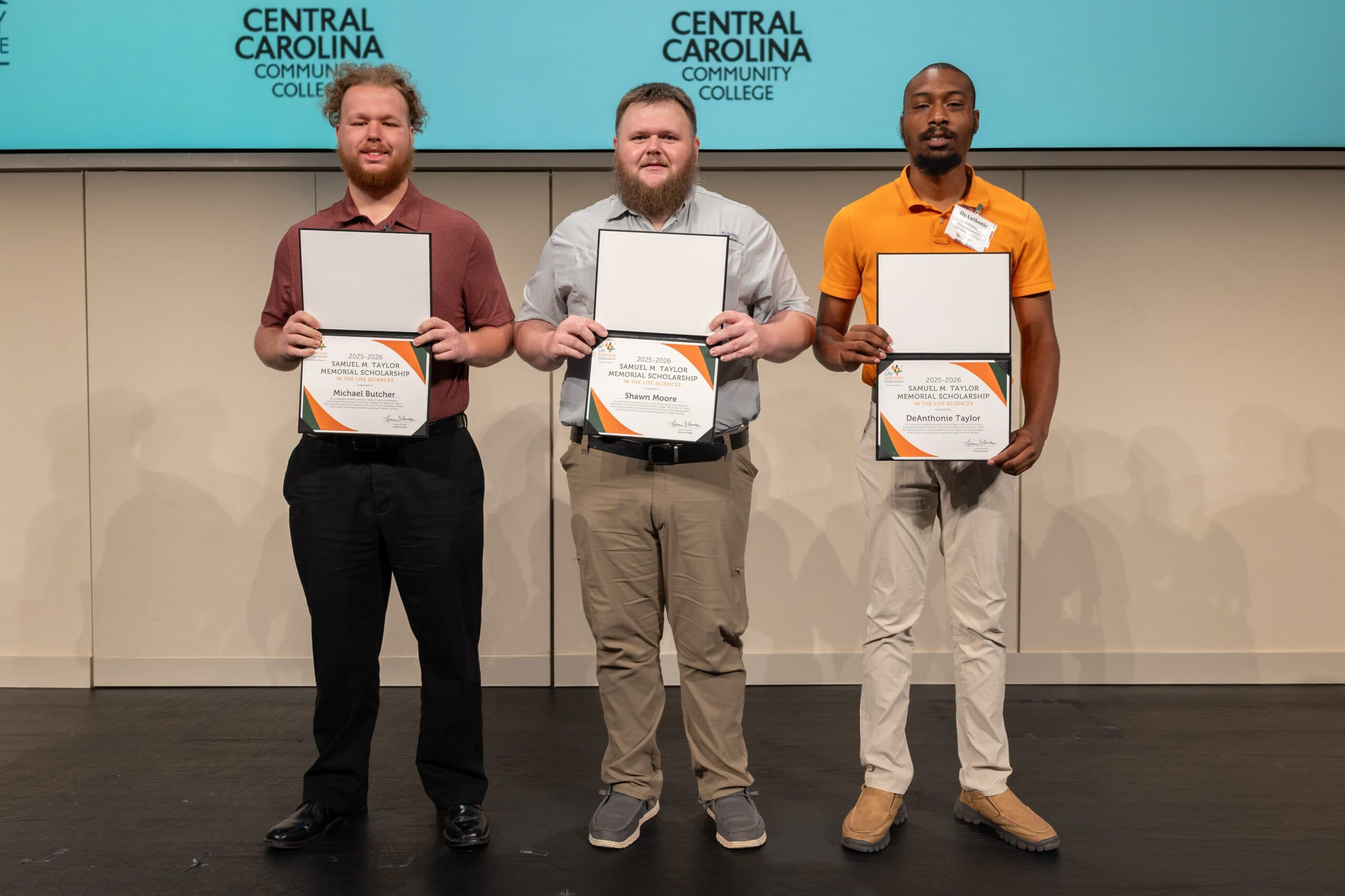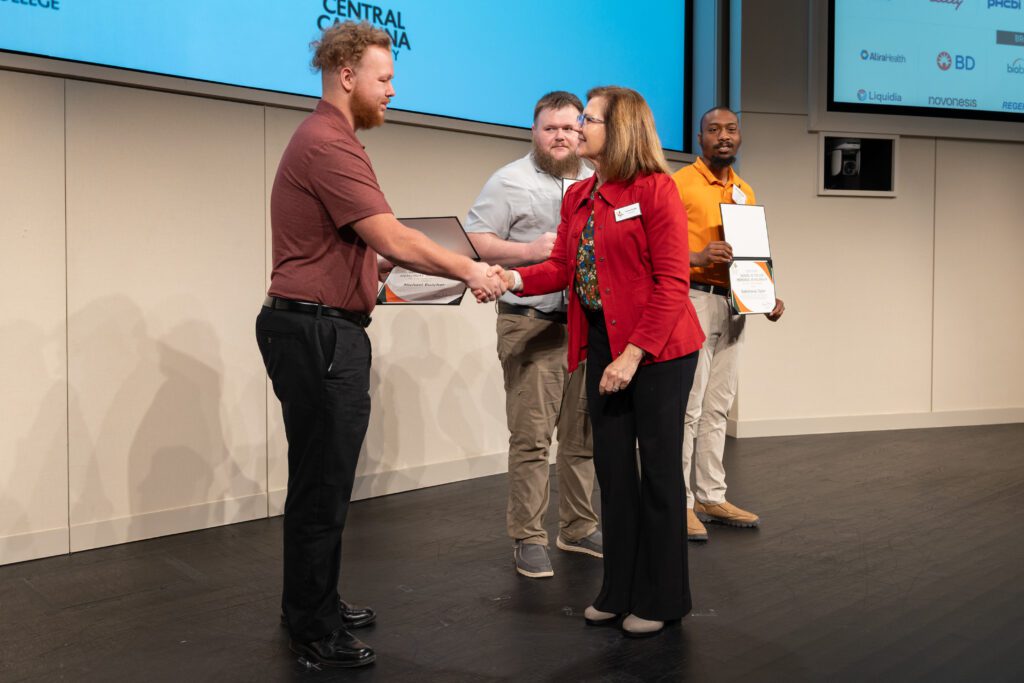NCLifeSci and NC Community Colleges announce 2025 Samuel M. Taylor Memorial Life Sciences Scholarship recipients

Published: September 24, 2025
RALEIGH, NC – The NC Life Sciences Organization (NCLifeSci), the NC Community College System, and the NC Community Colleges Foundation (Foundation) today announced the Samuel M. Taylor Memorial Life Sciences Scholarship Recipients for 2025-2026. Three students have been awarded this prestigious educational scholarship that will empower them to develop the industry-critical skills required to succeed in the biotechnology and life sciences fields.
The 2025-2026 scholarship recipients are:
- DeAnthonie Taylor of Central Carolina Community College
Program: Bioprocess Technology
- Shawn Moore of Central Carolina Community College
Program: Bioprocess Technology
- Michael Butcher of Montgomery Community College
Program: Facility Maintenance Technology
The Samuel M. Taylor Memorial Life Sciences Scholarship (Sam Taylor Scholarship) was established by NCLifeSci in memory of the late Samuel M. Taylor, a long-time leader in the life sciences sector and advocate for biotechnology education across the state. It provides financial assistance to community college students preparing for careers in life sciences and related fields. A committee of representatives from NCLifeSci, the System Office, and the Foundation selects recipients each year.
“I’m proud of these students for taking this next step in their education,” said Dr. Jeff Cox, President of the North Carolina Community College System. “North Carolina’s life sciences industry is thriving, and opportunities are wide open for students who want to build their careers here. Scholarships like this help our students get the training they need while building the workforce our state depends on.”

All three recipients expressed a desire to use their training to benefit others. Shawn Moore plans to pursue a career in biopharmaceutical manufacturing because of the field’s vital role in improving lives and driving innovation. DeAnthonie Taylor envisions combating the opioid crisis in his community by developing new treatments and technologies. Michael Butcher plans to support scientists and safeguard research environments through his work in facility maintenance.
North Carolina is home to one of the world’s largest life sciences clusters, and the industry continues to expand, creating jobs with competitive salaries and strong career paths. Biotechnology, the industry’s most prominent subsector, drives advances in food production, medicine, and vaccine development.
The Research Triangle alone hosts more than 600 life sciences companies and over 24,000 employees, with strengths in biotechnology and pharmaceuticals, according to the Economic Development Partnership of North Carolina (EDPNC).
Initiatives like BioNetwork are helping connect the dots between community colleges, companies, and the workforce through talent development and talent acquisition. BioNetwork was established in 2003 as the life sciences training initiative of the North Carolina Community College System. It designs and delivers biomanufacturing and food production training, eLearning, lab testing services, and customized training services to community colleges. Learn more about how BioNetwork helps students.
Sam Taylor strongly advocated for this work and for the industry’s ability to improve lives, whether by healing patients, feeding people, or protecting the environment. He also understood the economic opportunities the sector creates for North Carolinians.
“Sam believed in the power of the life sciences industry to improve lives and strengthen communities,” said NCLifeSci President Laura Gunter. “His commitment to building up our state’s life sciences industry is a big part of why it is so strong today, and he wanted North Carolinians to have access to the education and training needed for rewarding life sciences careers.”
To continue his legacy, more than 80 donors have contributed more than $250,000 to establish the Sam Taylor Scholarship fund at the Foundation for students enrolled in community college programs in the life sciences. To date, the fund has awarded scholarships to 22 students.
Leadership gifts for the Sam Taylor Scholarship fund were provided by Alexandria Real Estate Equities, Amgen, Biogen, and Hatteras Venture Partners. Grifols, Novo Nordisk, Frankel Staffing Partners, FUJIFILM Diosynth Biotechnologies, Thermo Fisher and Smith Anderson also made significant contributions to the scholarship fund.
For more information, contact David Etchison, Communications Director at NCLifeSci, at davidetchison@nclifesci.org.
About NC Life Sciences Organizations (NCLifeSci)
NCLifeSci is dedicated to promoting the future growth and development of North Carolina’s life sciences industry. NCLifeSci advocates for state and federal public policies that encourage the growth of life sciences companies and supports the development of a strong life sciences workforce. NCLifeSci’s ultimate goal is to help North Carolina’s life sciences community fulfill its extraordinary promise as a source of economic opportunity and improved quality of life for citizens of North Carolina and people around the world.
About the NC Community College System
The NC Community College System, under the leadership of President Jeff Cox, is the primary agency for workforce development training, adult literacy and education, and vocational and technical education in NC. Based in Raleigh with more than 200 employees, the System Office is responsible for stewarding System finances and academic affairs, advancing innovative student success initiatives, and empowering several statewide economic and workforce development programs.
About NC Community Colleges Foundation
The NC Community Colleges Foundation (Foundation) is a nonpartisan, nonprofit organization founded in 1986 to support the NC Community College System. The Foundation is governed by a diverse board of directors who, together with staff members, raise awareness and funds to advance the System’s mission, manage several scholarship and award programs that honor excellence, and support public-private partnership programs that foster innovation.